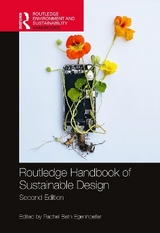
Routledge Handbook of Sustainable Design
Routledge (Verlag)
978-1-138-65017-6 (ISBN)
- Titel erscheint in neuer Auflage
- Artikel merken
The Routledge Handbook of Sustainable Design considers the design, not only of artifacts, but of structures, systems, and interactions that bear our decisions and identities in the context of sustaining our shared planet. In addressing issues of design for global impact, behavior change, systems and strategy, ethics and values, this handbook presents a unique and powerful design perspective.
Just as there are multiple definitions of design, so there are several definitions of sustainability, making it difficult to find unity. The term can sometimes be seen as a goal to achieve, or a characteristic to check off on a list of criteria. In actuality, we will never finish being sustainable. We must instead always strive to design, work, and live sustainably. The voices throughout this handbook present many different characteristics, layers, approaches, and perspectives in this journey of sustaining.
This handbook divides into five sections, which together present a holistic approach to understanding the many facets of sustainable design:
Part 1: Systems and Design
Part 2: Global Impact
Part 3: Values, Ethics, and Identity
Part 4: Design for Behavior Change
Part 5: Moving Forward
This handbook will be invaluable to those wishing to broaden their understanding of sustainable design and students and practitioners of Environmental Studies, Architecture, Product Design and the Visual Arts.
Rachel Beth Egenhoefer is a designer, artist, writer, and professor, whose work integrates technology, craft, and design. Her work focuses on sustainability and systems thinking in the context of behavior change. As an educator, she is involved in several initiatives to promote sustainability in both the design field and across higher education curricula. Egenhoefer is an Associate Professor of Design in the Department of Art + Architecture at the University of San Francisco.
Introduction
Rachel Beth Egenhoefer
1. The Political Economy of Design in a Hotter Time
David W. Orr
Part 1: Systems and Design
2. Systems Thinking for Design
Diana Wright, Marta Ceroni
3. Design Strategies for Impact
John Bruce
4. Applied Sustainability
Wendy Jedlička, Jeremy Faludi, Dr. Pete Markiewicz, Tim Frick, Mark McCahill
5. Sustainable Design for Scale
Andrea Steves, Rebecca Silver
6. Systems and Service Design and the Circular Economy
Rhoda Trimingham, Ksenija Kuzmina, Yaone Rapitsenyane,
7. Ecological Theory in Design: Participant Designers in an Age of Entanglement
Joanna Boehnert
Part 2: Global Impact
8. Global Perspectives for Sustainable Design
Douglas Bourn
9. Politics and Sustainability
Harold Wilhite
10. Design for Localization
Helena Norberg-Hodge
11. Intercultural Collaborations in Sustainable Design Education
Denielle Emans, Kelly Murdoch-Kitt
12. Life cycle thinking and sustainable design for emerging consumer electronic product systems
Erinn G. Ryen, Callie W. Babbitt, Alex Lobos
13. Data Clouds and the Environment
Arman Shehabi
14. Increasing Urban Sustainability using GIS
Luiz Felipe Guanaes Rego, Maria Fernanda Campos Lemos, Luís Carlos Soares Madeira Domingues
Part 3: Values, Ethics, and Identity
15. Empathy, Values, and Situated Action: Sustaining People and Planet Through Human Centered Design
Bruce Hanington
16. Practicing Empathy to Connect People and the Environment
Theresa J. Edmonds
17. Surrendering to the ocean: Practices of mindfulness and presence in designing
Yoko Akama
18. Confronting the Five Paradoxes of Humanitarian Design
Brita Fladvad Nielsen
19. Co-Designing for Development
Maria Rogal, Raúl Sánchez
20. The Internet of Life: Changing Lifestyles and Sustainable Values in Fast-developing China and India
Leong B.D., Lee Y.H.B.
21. Fashion, the City, and the Spectacle
Dilys Williams
22. Designing individual careers and work environments for sustainable value
Cynthia Scott
Part 4: Design for Behavior Change
23. An Introduction to Design for Sustainable Behaviour
Casper Boks
24. How Design Influences Habits
Tang Tang, Seahwa Won
25. The Temporal Fallacy: Design and Emotional Obsolescence
Jonathan Chapman, Giovanni Marmont
26. Discourse Design: The Art of Rhetoric and Science of Persuasion
Marilyn DeLaure
27. Using data visualization to shift behaviors
Adam Nieman
28. Securing Sustainability: Culture and Emotions as Barriers to Environmental Change
Allison Ford, Kari Marie Norgaard
29. Nature based design for health and well-being promoting cities
Angela Reeve, Cheryl Desha, Omniua El Baghdadi
Part 5: Moving Forward
30. How many ways to design for sustainability?
Fabrizio Ceschin, Idil Gaziulusoy
31. The Structure of Structural Change: Making a Habit of Being Alienated as a Designer
Cameron Tonkinwise
32. Empowering Citizens through Design
Diamond James
33. Biomimicry: Nature Inspiring Design
Denise K, DeLuca
34. The Value of the Sharing Economy
Brhmie Balaram
35. Going from STEM to STEAM
Sara Kapadia
36. Design for the Circular Economy
Ruud Balkenende, Nancy Bocken, and Conny Bakker
| Erscheinungsdatum | 29.08.2017 |
|---|---|
| Reihe/Serie | Routledge Environment and Sustainability Handbooks |
| Zusatzinfo | 11 Tables, black and white; 33 Line drawings, black and white; 35 Halftones, black and white |
| Verlagsort | London |
| Sprache | englisch |
| Maße | 174 x 246 mm |
| Gewicht | 1065 g |
| Themenwelt | Kunst / Musik / Theater ► Design / Innenarchitektur / Mode |
| Naturwissenschaften ► Biologie ► Ökologie / Naturschutz | |
| Sozialwissenschaften ► Soziologie | |
| Technik ► Architektur | |
| Technik ► Umwelttechnik / Biotechnologie | |
| ISBN-10 | 1-138-65017-X / 113865017X |
| ISBN-13 | 978-1-138-65017-6 / 9781138650176 |
| Zustand | Neuware |
| Informationen gemäß Produktsicherheitsverordnung (GPSR) | |
| Haben Sie eine Frage zum Produkt? |
aus dem Bereich



